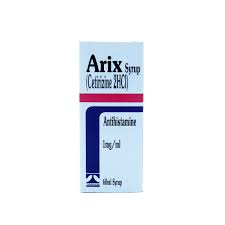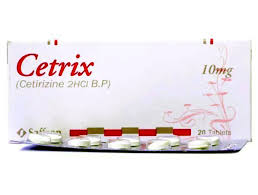Arix (1mg/Ml) 60ml Syrup
-
Description
Cetirizine is an antihistamine that works by blocking the action of histamine, a substance produced by the body during allergic reactions. Histamine binds to H1 receptors in the body, causing symptoms such as itching, swelling, and inflammation. Cetirizine specifically targets and inhibits the H1 receptors, thereby preventing the effects of histamine. This reduces the typical allergic symptoms, such as runny nose, sneezing, itching, and watery eyes, without significantly affecting the central nervous system, making it less sedating than older antihistamines.
-
Ingredients
Cetirizine
-
Drug Class
second-generation antihistamines
Description
-
Description
Cetirizine is an antihistamine that works by blocking the action of histamine, a substance produced by the body during allergic reactions. Histamine binds to H1 receptors in the body, causing symptoms such as itching, swelling, and inflammation. Cetirizine specifically targets and inhibits the H1 receptors, thereby preventing the effects of histamine. This reduces the typical allergic symptoms, such as runny nose, sneezing, itching, and watery eyes, without significantly affecting the central nervous system, making it less sedating than older antihistamines.
-
Ingredients
Cetirizine
-
Drug Class
second-generation antihistamines
-
Dosage Form
Syrup/Suspension
-
Uses
The following are the uses of Cetirizine Syrup/Suspension:
- Relief of symptoms associated with seasonal allergic rhinitis, such as sneezing, runny or itchy nose, and itchy or watery eyes.
- Treatment of perennial allergic rhinitis in patients with year-round allergies.
- Management of allergic conjunctivitis, including eye irritation, redness, and itching caused by allergens.
- Treatment of urticaria (hives) to relieve itching, redness, and swelling.
- Alleviation of skin reactions due to insect bites or stings.
- Used to provide symptomatic relief in cases of hay fever and other types of allergic reactions.
-
Dosage
Following are the doses of Cetirizine Syrup/Suspension:
- The usual dose for adults and children over 12 years old is 10 mg (10 mL) once daily.
- For children aged 6 to 12 years, the recommended dose is 5 mg (5 mL) once daily.
- For children aged 2 to 5 years, the typical dose is 2.5 mg (2.5 mL) once daily.
- For children under 2 years old, the dosing should be determined by a healthcare provider based on the child’s weight and condition.
- In cases of severe allergic reactions or as prescribed by a healthcare provider, the dose may be adjusted.
-
In case of Overdose
In case of an overdose of Cetirizine Syrup/Suspension, immediate medical attention should be sought. Symptoms of overdose may include drowsiness, tachycardia, headache, or dry mouth. If an overdose occurs, it is important not to induce vomiting unless instructed by a healthcare provider. If the medication is ingested in excess, contact a poison control center or seek emergency medical help. In some cases, activated charcoal may be recommended to help absorb the excess drug, but this should only be done under the guidance of a healthcare professional. Always follow the prescribed dosage to avoid overdose.
-
Missed Dose
If you miss a dose of Cetirizine Syrup/Suspension, take it as soon as you remember. However, if it is almost time for your next dose, skip the missed dose and continue with your regular dosing schedule. Do not take two doses at the same time to make up for the missed dose, as this could increase the risk of side effects.
-
How To Use
To use Cetirizine Syrup/Suspension, follow the instructions provided by your healthcare provider or as indicated on the prescription label. Typically, it should be taken once daily, with or without food. Measure the dose using the provided measuring cup or spoon, and swallow the syrup directly. It’s important to take the medication at the same time each day to help you remember and maintain consistent levels in your body.
-
When Not to Use
Following are the situations when Cetirizine Syrup/Suspension should not be used:
- Should not be used in individuals with a known allergy to Cetirizine or any of the components of the syrup.
- Contraindicated in patients who have a history of hypersensitivity reactions to other antihistamines.
- Should be avoided in patients with severe renal impairment (e.g., end-stage renal disease) unless prescribed by a healthcare provider.
- Should not be used if there is a known history of alcohol or drug abuse, as combining Cetirizine with alcohol can increase drowsiness and other side effects.
-
Side Effects
The side effects of Cetirizine Syrup/Suspension may include:
- Drowsiness
- Dry mouth
- Headache
- Dizziness
- Nausea
- Fatigue
- Stomach pain
- Sore throat
- Rash or itching
-
Precautions & Warnings
Following are the precautions and warnings for Cetirizine Syrup/Suspension:
- Should not be used in individuals with a known allergy to Cetirizine or any of the components of the syrup.
- Caution is advised in patients with a history of kidney problems, as dosage adjustments may be required in cases of renal impairment.
- Caution is advised when using Cetirizine with alcohol or other central nervous system depressants, as this may increase drowsiness or other side effects.
- Patients who experience extreme drowsiness should avoid activities that require mental alertness, such as driving or operating machinery.
- Should not be used in children under 2 years old unless prescribed by a healthcare provider.
- Pregnant and breastfeeding women should consult their healthcare provider before using Cetirizine.
-
Drug Interactions
Following are the drug interactions for Cetirizine Syrup/Suspension:
- Concomitant use with alcohol or other central nervous system depressants (e.g., sedatives, tranquilizers) may increase the risk of drowsiness, dizziness, and impaired coordination.
- Cetirizine may interact with certain sedatives, increasing sedative effects.
- Caution is advised when using Cetirizine with other antihistamines, as this may lead to increased sedative effects or drowsiness.
- Cetirizine may interact with theophylline, which can increase the risk of side effects or reduce the clearance of Cetirizine.
- Use caution when combining Cetirizine with drugs that can affect liver or kidney function, as dosage adjustments may be necessary.
- Always consult your healthcare provider or pharmacist for advice on potential interactions with other medications you are taking.
-
Food Interactions
Following are the food interactions for Cetirizine Syrup/Suspension:
- There are no significant food interactions with Cetirizine.
- However, consuming alcohol while taking Cetirizine can increase drowsiness and impair your ability to perform tasks that require alertness, such as driving or operating machinery.
- It is recommended to avoid alcohol consumption or consult your healthcare provider if you plan to drink while using Cetirizine.
- Taking Cetirizine with food may help reduce the likelihood of stomach upset, but it can be taken with or without food based on your preference.
-
Storage/Disposal
Cetirizine Syrup/Suspension should be stored in a cool, dry place at room temperature, away from direct sunlight and heat sources. It should be kept tightly closed in its original container to prevent contamination. Make sure the syrup is kept out of reach of children. Do not store it in the bathroom, as humidity can affect the medication’s effectiveness. If the expiration date has passed or if the syrup is no longer needed, dispose of it properly by following the instructions provided by your healthcare provider or pharmacist. Do not flush the syrup down the toilet or pour it into drains unless specifically instructed to do so. Proper disposal helps protect the environment and prevent unintended use.
-
Quick Tips, if any
Following are the quick tips for Cetirizine Syrup/Suspension:
- Use Cetirizine syrup as prescribed by your healthcare provider for the best results.
- Shake the bottle well before each use to ensure the medication is properly mixed.
- Measure the syrup using the provided dosing cup or syringe to ensure the correct dose.
- Avoid consuming alcohol while taking Cetirizine to prevent increased drowsiness and impaired alertness.
- If you experience any drowsiness, avoid activities that require concentration, such as driving or operating machinery.
- If you miss a dose, take it as soon as you remember, but skip the missed dose if it’s almost time for your next dose.






Reviews
There are no reviews yet.